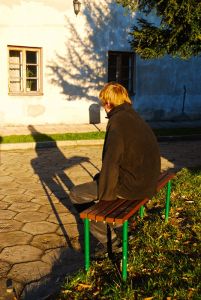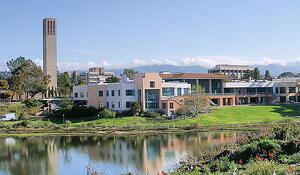 Stuttering is a potentially embarrassing, yet somewhat common affliction that affects nearly one percent of people worldwide. Characterized as a speech pattern in which people stumble, sputter and “trip over their tongue”, stuttering is one step closer to being understood thanks to researchers at UCSB.
Stuttering is a potentially embarrassing, yet somewhat common affliction that affects nearly one percent of people worldwide. Characterized as a speech pattern in which people stumble, sputter and “trip over their tongue”, stuttering is one step closer to being understood thanks to researchers at UCSB.
Researchers at University of California, Santa Barbara have conducted two studies intended to help understand the root cause and treatment of stuttering. The first study, led by UCSB’s Roger Ingham, compares a new treatment developed at UCSB to the standard best practices protocol. The second study, by UCSB professor Scott Grafton, uses imaging to identify abnormal areas of white matter in the brains of adult stutterers.
According to a university press release, Roger Ingham’s Modifying Phonation Intervals (MPI) Stuttering Treatment Program is a new approach to stuttering treatment that requires intensive therapy and long learning sessions, and involves feedback from a specialized iPad app.
“It’s not a five-minute job,” said Ingham, lead author of the paper on MPI’s efficacy. “A person who stutters needs to be under this treatment system for two to three hours a day, six days a week for the first phase of the program, which lasts about three weeks.”
Ingham noted that twice as many people receiving the MPI treatment were successful in maintaining naturally fluent speech 12 months after they finished the program compared to those receiving the current standard treatment.
In compliment to Ingham’s work in the treatment phase, Scott Grafton’s study takes aim at the root cause of stuttering, found to be within the white matter of the human brain. Grafton’s imaging study used diffusion spectrum imaging (DSI) in an MRI scanner to examine the white matter in the brains of eight adult stutterers.
According to his study, published in the Journal of Speech, Language, and Hearing Research, Grafton and his team discovered abnormalities of the arcuate fasciculus, one of the key pathways that connect the language areas of the brain.
Once treated as a psychological or emotional condition, stuttering can now be traced to brain neuroanatomy and physiology, according to the researchers. “We’re one of a number of groups making a strong case that there is something fundamentally different about the brains of people who stutter,” Grafton said, “It opens up a lot of opportunities, not just for stutterers but for all kinds of developmental problem like dyslexia, childhood speech apraxia and disorders of coordination.”
 In addition to groundbreaking research in the areas of neuroanatomy and speech therapy, researchers at UCSB are involved of several vital areas of bioresearch, including stem cell biology and engineering, and Alzheimer’s research.
In addition to groundbreaking research in the areas of neuroanatomy and speech therapy, researchers at UCSB are involved of several vital areas of bioresearch, including stem cell biology and engineering, and Alzheimer’s research.
Some key stats to consider from UCSB:
- UC Santa Barbara will be conducting lineal trials for a new drug to prevent Alzheimer's with the support of $100 million over a five-year period.
- Researchers at UCSB received $162.6 million in direct and indirect federal funding in the 2013-2014 fiscal year.
- The NIH awarded UCSB researchers a 5-year, $4.5 million grant for a study titled "Ambulatory Artificial Pancreas: Merging Physiology, Behavior, and Control design".
- The NIH awarded UCSB researchers a grant of $2.27 million over 5 years to study neurodegenerative diseases.
 As a top-level California research institution, University of California, Santa Barbara makes use of millions of dollars in NIH funding, private donations and state grants every year.
As a top-level California research institution, University of California, Santa Barbara makes use of millions of dollars in NIH funding, private donations and state grants every year.
This large and active research marketplace is home to the BioResearch Product Faire™ Front Line Event at UC Santa Barbara on March 31, 2015. This event is a great opportunity for researchers to learn about the latest biotech and lab supplies, and for lab vendors to promote their products to hundreds of active researchers under one roof.
To learn more about attending the BioResearch Product Faire Event at UCSB as an exhibitor or as a researcher, please click below:



